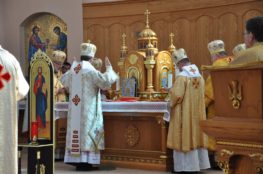In the combox to yesterday’s post, “A Comment on Synodality, East and West,” a reader by the name of Luke wrote the following:
That is a paradox that I still can’t wrap my head around: the Orthodox with a decentralized authority have no power to implement a Novus Ordo for example yet they have not turned in to Anglicanism East without a Pope. However, could you imagine the Catholic Church in the U.S without the intervention of JPII or BXVI?
Before I could type out a reply, Rod Dreher, over at The American Conservative, issued a similar query to his readers:
1. Why does the Orthodox Church, which lacks the centralized office of the papacy, and lacks magisterial offices, hold to historical, orthodox Christianity better than the Roman Catholic Church, which has these offices, and in theory ought to have a firmer hold on these things?
One can develop all sorts of sociological, historical, and psychological explanations for Catholic/Orthodox divergences, but they’re probably not terribly helpful. Certain Orthodox living in the (geographic) West enjoy grand narratives filled with Western philosophical-theological decadence and pristine Eastern mysticism, perhaps because it makes them feel like they have found a safe haven in Orthodoxy, free from the complications of (post)modernity. I have never had much patience for such “thinking,” as I have explained in various posts (see, e.g., “The Myth of Hart“). Whether Dreher buys into any of that stuff or not is difficult to say. Assuming he has read his Florovsky, Schmemann, and Meyendorff carefully, he knows full well that the Orthodox Church has never been isolated from intellectual developments and ideological upheavals which are, mistakenly, identified as exclusively “Western.” If there is anything distinctly “Eastern” in Orthodoxy, it is its occasionally obstinate refusal to be open, honest, and self-critical, particularly when it comes to its complicated, and sometimes tragic, relationship with both Roman and Greek Catholicism. At the same time, however, it cannot be denied that Orthodoxy’s “closedness” has protected it from time to time against certain secular-liberal currents that have no business being imported into any Christian confession.
As for Dreher’s question specifically, it’s not even worth answering. It is not worth answering because it is formulated with the assumption that the institutional Orthodox Church “hold[s] to historical, orthodox Christianity better than the” institutional Roman Catholic Church. No Catholic in their right mind would accept that. What Catholics with eyes to see and ears to hear accept is that when it comes to priests and bishops — the body of individuals charged with preserving and passing on the Apostolic Faith — the Orthodox Church appears to have a relative advantage, at least at the global level. Anybody who has spent serious time around Orthodoxy in America knows that “exclusively Catholic problems” such as the so-called “Lavender Mafia,” clerical sexual abuse, lax discipline, moral and doctrinal confusion, and so on, and so forth, can all be found amidst the icons and incense, too. But American Orthodoxy is small and its representation in certain academic, ecumenical, and political circles is grossly disproportionate. Across the pond, ostensibly rigorous Orthodoxy has done no better job holding back cultural decline in Greece than allegedly lackadaisical Catholicism has done in Italy. Both countries are suffering from civilizational exhaustion. Then again, so is ours — and neither the Catholic nor Orthodox churches are doing a damn thing about it.




October 20, 2015
My this does get tiresome. One of the first liturgical rebellions was instituted by the Tzar in 1666 in Russia, which resulted in a schism that still exists within the Russian Church between those who accepted the new rite and those who remained loyal to the old rite.
Also, Orthodoxy has been very much influenced by cultural and intellectual currents from the west. The Slavophiles are really not much more than a very Slavic reaction to the Romantic/nationalist movements that emanated from the West in the 19th century.
Much of the so-called revival of a purer Byzantine style of ikonography corresponds to the similar movement in the west, usually known as the Gothic Revival.
There are many subtile changes in the Byzantine tradition that reflect the novus ordo of Vatican II, such as white for funerals (Black or other dark colors were always the tradition when I was younger, many years ago).
One reason that there perhaps has not been a wholesale, thank God, destruction of the liturgical tradition in Byzantine Orthodoxy is that in many ways the liturgy is considered a national antique. And making changes is difficult for this reason.
October 20, 2015
On the same note, if one bothers to read the present Ecumenical Patriarch’s open support for abortion as simply a mother’s personal choice; well, no amount of pretty liturgy is going to be much help. And I like pretty liturgies.
October 20, 2015
Something’s rotten in Finnish Orthodoxy:
http://nftu.net/met-ambrosius-finnish-church-greek-archimandrite-we-re-evaluate-understanding-marriage/
I remember hearing Archimandrite Manoussakis give a modestly “pro-papal” discourse at a conference at Fordham University some years ago; and now this!
October 20, 2015
Ouch. Somebody needs to arrange a debate between Metropolitan Ambrosius and Archbishop Cupich on the merits of orthodoxy. First one to bring himself to defend an orthodox teaching is the winner.
October 20, 2015
Sometimes rank heresy breathes with both lungs.
October 21, 2015
Please consider the source of this “news”- a “true Orthodox” website.
October 21, 2015
There’s always some excuse or explanation, inn’t there? 😉
October 21, 2015
I would say, “This is probably made up” is a pretty darn good excuse.
October 21, 2015
I dunno Ryan, the really shocking pro-abortion mutterings of the Ecumenical Patriarch are most certainly not made up and well-documented; nor his representative in North America grovelling before President Obama calling him “The New Alexander.”
October 22, 2015
And if you can find a reputable source supporting this claim about the Finnish metropolitan, I would be happy to take it seriously.
October 22, 2015
Honestly Ryan, I could care less about a Lutheran bishopess inside the altar of a Finnish Church, period. That pales in comparison to the pro-abortionist position of the Ecumenical Patriarch.
October 21, 2015
The answer to Rod’s question, simply, is money.
October 21, 2015
The root of all evil, as they say.
October 21, 2015
Assuming [Rod] has read his Florovsky, Schmemann, and Meyendorff carefully….
I think this ranks as one of the funniest things I have ever encountered on the Interwebs.
October 22, 2015
[…] single sentence in my earlier post, “A Brief Comment on Rod Dreher, Orthodoxy, and Catholicism,” has caused discomfort among some readers on Facebook, some of whom appear to be converts to […]